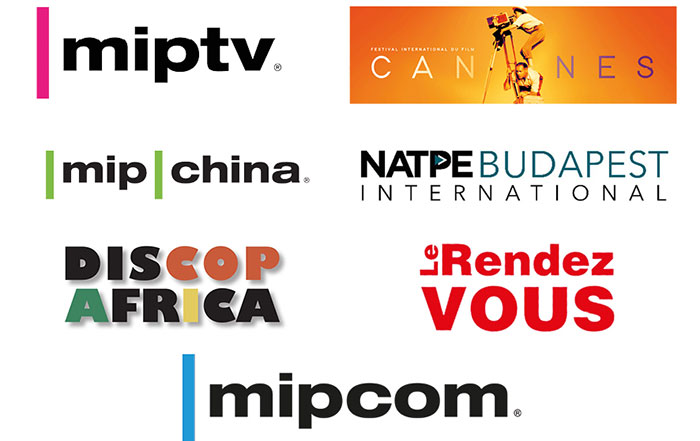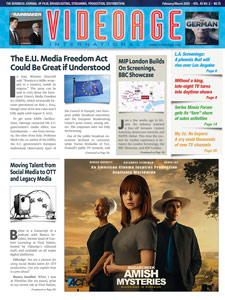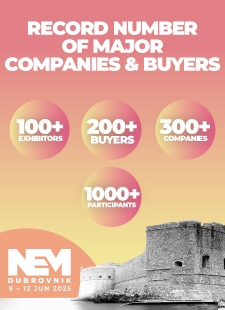To analyze the deluge of virtual trade shows that hit the entertainment industry this year, VideoAge contacted 12 executives from eight countries to comment on seven recent live events that were canceled due to COVID-19. The virtual markets that were scrutinized for this November edition were: MIP-TV, the Cannes Film Festival, MIP China, NATPE Budapest, DISCOP Africa, Le Rendez Vous, and MIPCOM.
Dermot Horan, director of Acquisitions for Ireland’s public TV network RTE, said that he “didn’t use MIP-TV very much,” and generally found MIPCOM to be a more fruitful market. That said, he was sad not to attend this year as he liked “the exclusive screenings and some of the panels.” But, he added, “I don’t need a market to arrange online appointments for me. I can do that myself using Teams and Zoom. Plus, the screenings could be more comprehensive. However, at the end of the day the reason we go to the markets is to meet people both formally at pre-arranged meetings, but also informally, and the latter is where you pick up a huge amount of information.” When asked which markets he’d attend on site and which he’d rather attend virtually in the future, he responded by saying that MIP-TV and MIPCOM would be attended “on site definitely,” before adding that he “doesn’t see a need to attend the others either in person or digitally.”
Tarmo Kivikallio, head of International Program Acquisitions for Finland’s public TV network YLE, attended Le Rendez-Vous and MIPCOM virtually. What he liked most about both markets was the ease of “screening from my sofa, with my own timetable.” However, he added, “If you watch a keynote or a panel discussion on screen, you could easily do something else at the same time, so it is actually more difficult to concentrate. This is more a personal problem, though, nothing to do with the events themselves. But it would be easier to be on site.” As far as improving the experience, Kivikallio said: “The organizers have to be more creative with regard to the virtual experience, [but] we still need events to actually meet and do business face to face. One MIP event per year would be good to have. Le Rendez-Vous could be a virtual one, as well as all the smaller screening events. The L.A. Screenings, the BBC Showcase, and London Screenings would be easier on-site.” He then added: “MIPCOM virtual was quite good. The interface had some problems, it was a bit difficult to use it, but I managed. I didn’t use the platform for meetings, but I tried to listen to some keynotes and panel discussions… Didn’t have enough time for many of them, though. Overall, after six months of using virtual tools it was much easier to attend MIPCOM than it was MIP-TV.”
Lily Caputo, director of Programming for Canada’s TLN Media, participated in MIPCOM virtual, and reported that it “was a good replacement to the in-person meetings.” However, she added, “most of us had some technical issues that we had to work around at some point.” She continued: “I know that due to the circumstances it was organized last minute, but with some tweaks to the system it can work better. For example, distributors’ catalogs or titles should be easier to find so buyers can screen the programs of interest. The set-up of virtual meetings should be organized at least two-to-three months in advance so that it can give us more time to review and look for programs, other distributors, and to schedule our agendas.” Despite these issues, she felt that the virtual MIPCOM was a positive experience. “Overall, the market was good and we were able to meet with existent and also new distributors,” she concluded.
David Kines, president and co-founder of Canada’s Hollywood Suite, was originally planning to “attend” MIPCOM, but ultimately did not. “That’s the biggest problem with virtual conferences,” he said. “Despite the best of intentions, it’s hard to block off the time to really zone in on them unless you get on a plane and go somewhere else. [But] I applaud them for trying, and I know they had some great panelists.”
Canada-based Krynn Wrigley, Gusto TV’s International Sales manager, logged onto MIPCOM online and found that “the features that stood out were the ‘Interested In You’ section, and the panel discussions. The aforementioned feature is similar to LinkedIn wherein you have access to view the profiles of people who have shown interest in you. It’s nice to get a sense of who is interested/or following your company. The discussion panels added a lot of value with topics such as diversity, resilience, and how industry experts are dealing with the ongoing pandemic.”
However, she pointed out that “the ‘Recommended For You’ matchmaking tool had a few faults. The algorithm kept dispatching seller profiles even though our profile was set to ‘seller seeking buyer.’ Also, as a visitor, not having the ability to book a meeting was challenging. The limited access and having to wait to make a connection with someone was time consuming.”
As far as aspects of the virtual experience that could be improved, Wrigley suggested “providing a list of delegates with their contact information. This would not only lessen the amount of time having to wait for others to connect, but give sellers the ability to book more meetings more efficiently. This provides a huge value to most, if not all participants — an added value that people would likely pay a little extra for.” She also stressed that buyers’ profiles should list the representative’s full title.
Ultimately, she’d prefer to attend MIPCOM in person. “We’d much prefer the South of France over sitting at home staring at a screen. It’s harder to stay engaged and keep focused.”
“Finally,” Wrigley added, “if the portal is based on making connections before being able to book meetings, they should open the portal more than a week in advance. It’s time-consuming for someone who is attending as a visitor to set up meetings with a buyer in short order.”
Cecilia Presto, content buyer for Buenos Aires, Argentina’s Canal 10, didn’t attend any of the aforementioned markets, but she confirmed registering for MIP Cancun Online Plus. However, she likes the concept of a virtual market in that “everything is found in one place with a unique password instead of visiting each distributor’s screening room [and having to contend] with its own security measures. I also enjoyed [the idea of] the daily reports, the panels, and the showcases that under normal conditions would be impossible to attend due to a crazy agenda of meetings.” She does, however, think that there’s room for improvement. “The back and forth with the distributor to get first-hand information about the content, its windows and availability, performance in different territories, expectations, etc.” could be improved. All that said, there’s something about in-person events that she just prefers. “I miss the interaction, the networking events, the possibility to ask questions to the distributor immediately after watching the content.” Nevertheless, in the future, she said she’d use “an online chat instead of a post-market follow-up” via email or on the phone.
Cesar O. Diaz, CEO of Miami, Florida-based 7A Media, reported: “I have not participated in any of the virtual markets mentioned. Given the price to participate as a seller/distributor, I couldn’t justify the cost to just showcase a couple of titles and then wait until the end to get a report of what clients may have watched or not.” He continued: “Some of the companies that I represent have participated and they will pass on to me the LATAM clients who have shown interest so that I can do the proper follow-ups.” He’s still toying with the idea of attending some in the future, but it isn’t sure if they’re worth their price tags. “MIP Cancun, for example, a full virtual market, is asking $2,000 to list up to 15 titles. I’m still considering, but once again, should I spend $2,000 to get meetings from clients whom I already know and can exchange emails with or call directly?”
MISTCO’s Aysegul Tuzun from Istanbul, Turkey attended MIP China and MIPCOM. “I liked MIP China as it offered a schedule agenda.” As for the usefulness of virtual markets, she said that, “In general, people, especially buyers, are not ready or willing to participate in these events.” However, given a choice, she would attend “MIP-TV virtually, but NATPE Budapest on site.”
Kerim Emrah Turna, executive director of Turkey’s Kanal D International, attended MIP-TV, MIP China, MIPCOM, Virtual Screenings Spring & Autumn, World Content Moscow, and Conecta Fiction. Of those, Turna liked Virtual Screenings Spring & Autumn and MIPCOM the best, and found MIP China’s “guaranteed pre-scheduled agenda of one-to-one online meetings with buyers” to be the most useful tool.
However, stated Turna, in general, “the buyers’ attendance should be higher, international attendance should be encouraged, and the databases should be updated.” Finally, Turna said: “Online market technology is at a very early stage. It will take some time to evolve. Online markets could be useful for smaller and regional markets, but for big international markets, on-site would still be the best option.”
From her Los Angeles office, Melissa Wohl, head of Sales for New York-based FilmRise, attended MIPCOM, the Cannes Film Festival, and TIFF. “Virtual meeting rooms and appointment set-up were very easy,” she said. “The ease of access to the seminars, talks, and interviews was helpful. We found good use for all the tools made available to us.” As far as improvements were concerned, for Wohl it was “hard to say, given that we’re operating in uncharted waters right now and the markets did an incredible job switching to all-virtual formats in very little time.” In terms of preferences, she’d rather attend MIP-TV, the Cannes Film Festival, and MIPCOM in person for a stronger brand presence.
Dianne Bissoon, who is in charge of Content Acquisition and Development for Cable Bahamas, did not attend any of the virtual markets indicated for this survey, yet she did “attend” the L.A. Screenings and Dataxis (an event specializing in market research that is normally held at the Biltmore Hotel in Miami, Florida in mid-October). “I liked that I could at least see a few trailers of L.A. Screenings content, and the Q&A sessions from the chat of both events,” Bissoon explained, before pointing out that, “I couldn’t say that I was 100 percent engaged because virtual conferences are distracting when you either get interrupted by work emails or phone calls. The value of face to face still outweighs virtual participation.” In terms of which markets she’d prefer attending in the future, she listed MIP-TV, the Cannes Film Festival, DISCOP Africa, and MIPCOM — but all on-site, not virtual.
Fabrizio Battocchio, head of Format and Factual at Italy’s Mediaset, said, “For the moment I’m only interested in participating in virtual markets that deal with formats, factual, and documentaries. If the situation improves I’d like to go back to Cannes for MIPCOM and to Biarritz [for Le Rendez Vous] for documentaries.”
Audio Version (a DV Works service)












Leave A Comment